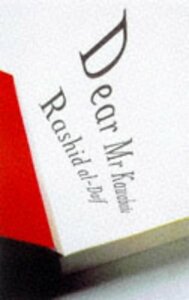Take a photo of a barcode or cover
Who was that man Rasheed saw on Hamra Street? Was it a reflection of a purer self before being tainted by the Lebanese civil war, or a friend he once knew in a distant past he now no longer identifies with?
There is something melancholic, if not ominous, about a novel written as an open letter to the Nobel Laureate writer Yasunari Kawabata who is unable to reply to our protagonist Rasheed, because Kawabata had long passed away by committing suicide.
Why did Rasheed choose to write a letter to someone that cannot answer? In essence, perhaps the pains of his journey and the questions that arise in the futility of the civil war never can be truly answered. Rasheed passes a tedious journey of self-discovery in a land that demands conformity. He is from a small Maronite village in Lebanon's North and where he first learns to embrace "modernity" and science, and veers away from traditions deeply rooted in family ties and religion.
This is a story (is it a story- or a memoir of many who possess the same fate?) of a young man who detaches himself from a legacy forced upon him, and relocates to West Beirut (the heart of the leftist parties) and joins the Communist movement wholeheartedly, but he soon begins to question the discrepancies found in its views.
What remains of a man in search of meaning between sectarianism, tribal loyalties, and religious extremities after 15 years of brutal violence, is the cruel realization that all you have sacrificed for amounts to nothing.
There is something melancholic, if not ominous, about a novel written as an open letter to the Nobel Laureate writer Yasunari Kawabata who is unable to reply to our protagonist Rasheed, because Kawabata had long passed away by committing suicide.
Why did Rasheed choose to write a letter to someone that cannot answer? In essence, perhaps the pains of his journey and the questions that arise in the futility of the civil war never can be truly answered. Rasheed passes a tedious journey of self-discovery in a land that demands conformity. He is from a small Maronite village in Lebanon's North and where he first learns to embrace "modernity" and science, and veers away from traditions deeply rooted in family ties and religion.
This is a story (is it a story- or a memoir of many who possess the same fate?) of a young man who detaches himself from a legacy forced upon him, and relocates to West Beirut (the heart of the leftist parties) and joins the Communist movement wholeheartedly, but he soon begins to question the discrepancies found in its views.
What remains of a man in search of meaning between sectarianism, tribal loyalties, and religious extremities after 15 years of brutal violence, is the cruel realization that all you have sacrificed for amounts to nothing.
I wish I had read this at a different time. I had a lot of trouble staying focused on the book but I blame in on my mental state, not the text. The resolutely nonlinear story felt like a memory, which was good. Some lovely phrasing.
